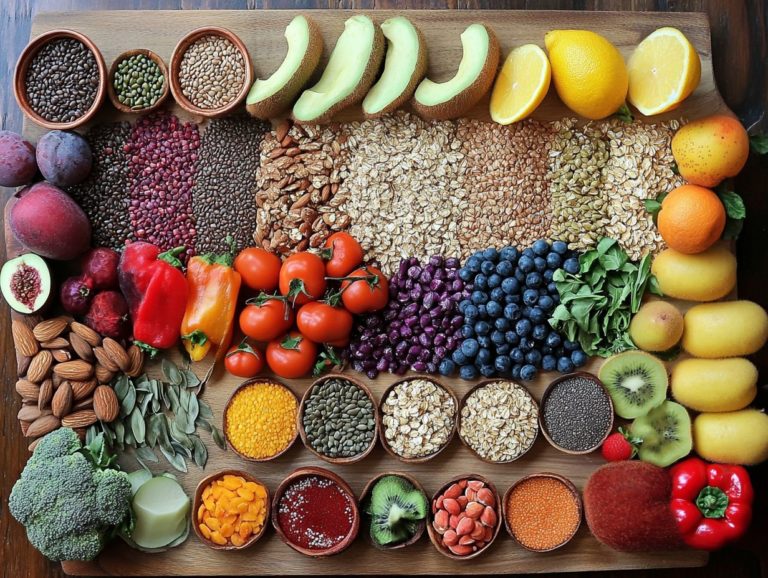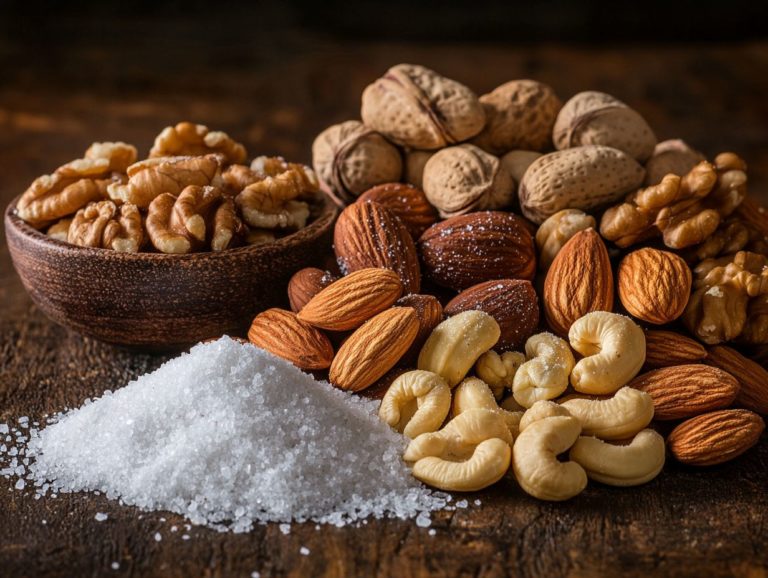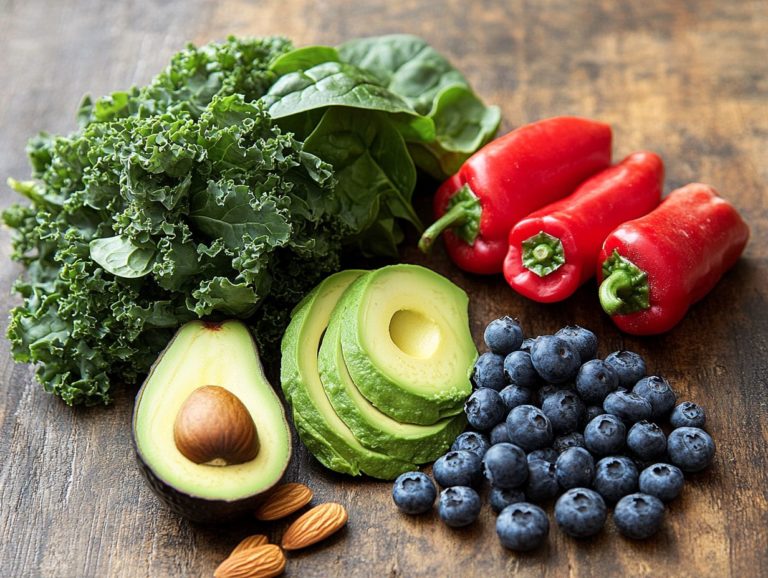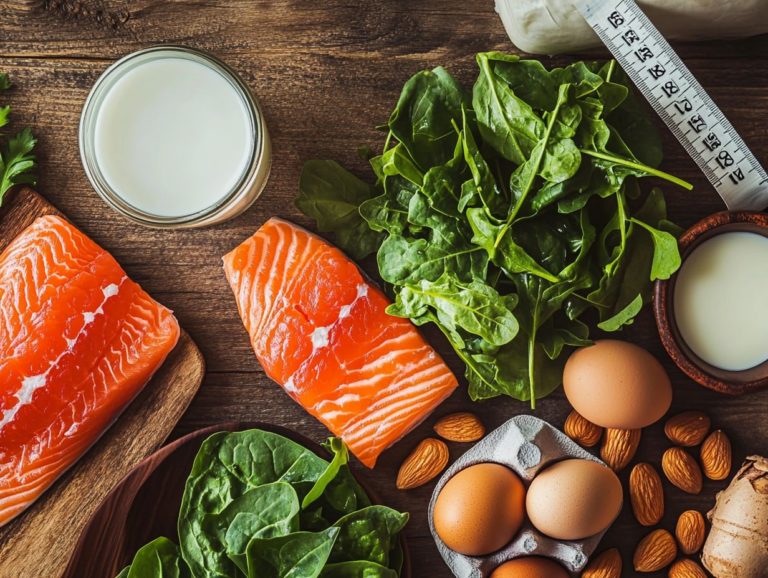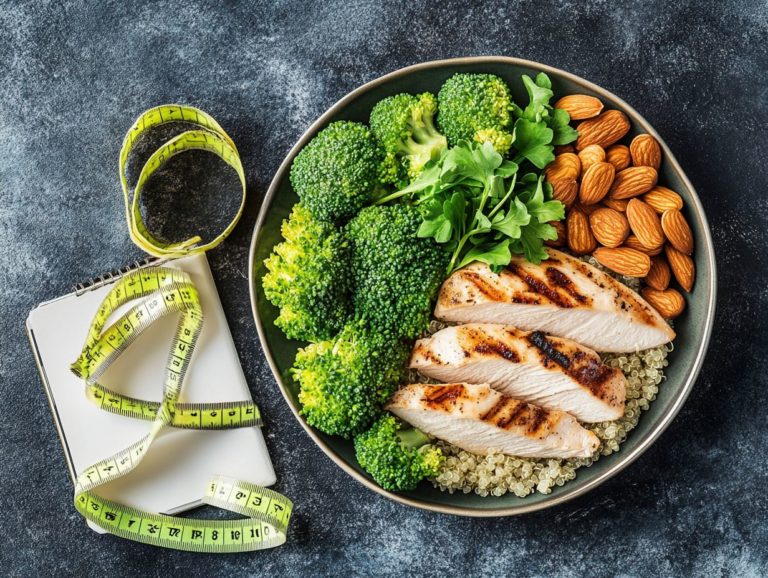How to Identify Nutrient-Dense Foods
Unlocking the secrets of nutrient density can transform your approach to eating. This article explores what nutrient density means and why it s crucial for your health and well-being.
You ll discover many benefits of adding nutrient-dense foods to your diet, learn how to identify them easily, and find out which key nutrients you should focus on.
You ll also find practical tips and delicious recipes to help you incorporate these powerhouse foods into your meals.
Jump in now and transform your eating habits!
Contents
Key Takeaways:
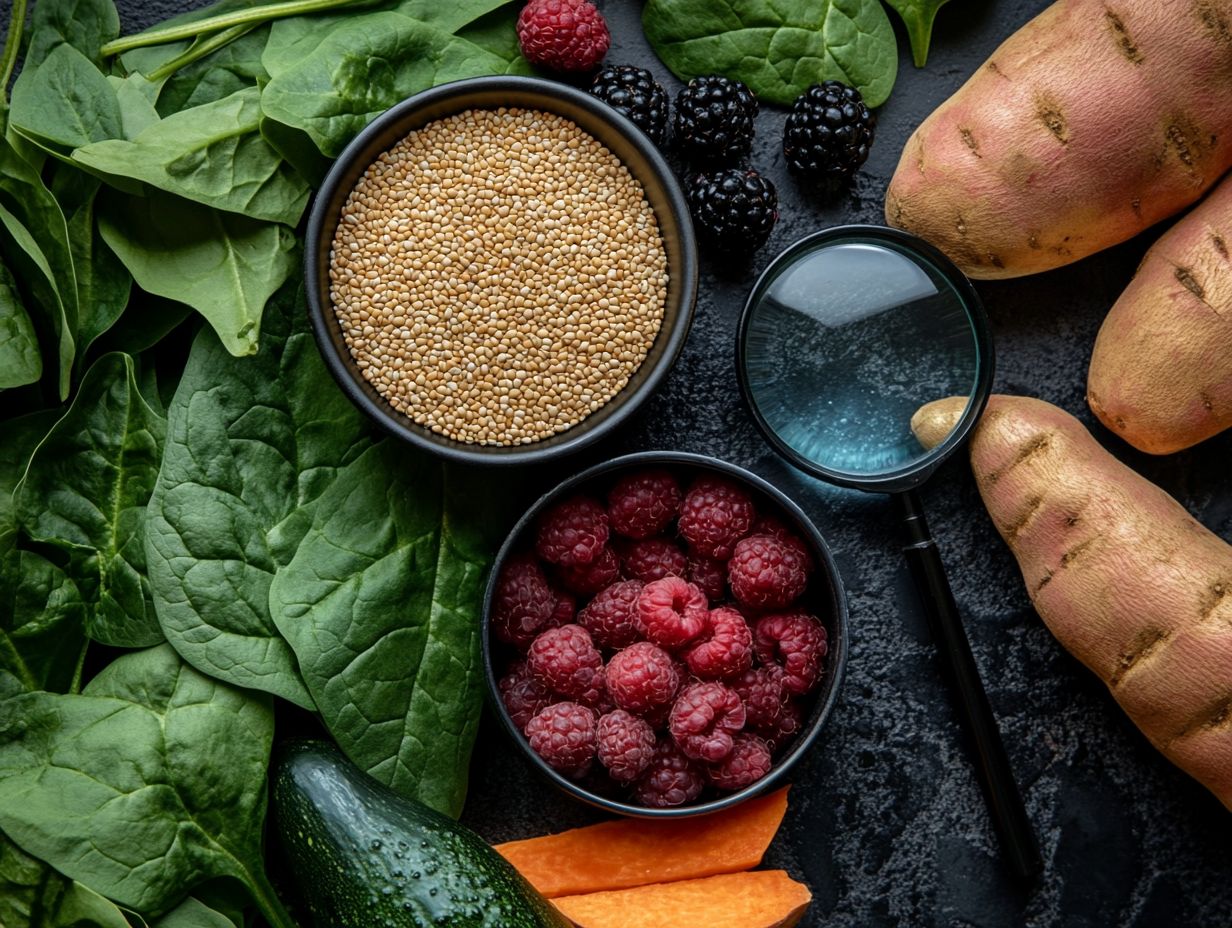
- Nutrient-dense foods are rich in essential vitamins, minerals, and other nutrients vital for health.
- They help improve overall health and prevent chronic diseases, making them important for a balanced diet.
- Key nutrients to look for include fiber, protein, healthy fats, and a variety of vitamins and minerals.
- You can easily incorporate these foods into your diet with the right tips and recipes.
Understanding Nutrient Density
Understanding nutrient density is essential for making informed food choices that meet your energy needs while maximizing your intake of vitamins and minerals.
Nutrient density measures the number of healthy nutrients in a food relative to its calorie content. By prioritizing nutrient-dense foods like fruits, vegetables, and whole grains you can improve your health and avoid nutrient deficiencies.
Defining Nutrient Density and Its Importance
Nutrient density refers to foods that provide a lot of nutrients for relatively few calories. This means choosing foods that not only satisfy your hunger but also support your overall health with essential vitamins, minerals, and antioxidants.
Consider these nutrient-rich options:
- Leafy greens
- Berries
- Legumes
These foods are packed with nutrients such as vitamin C, iron, and fiber while being low in calories. In contrast, nutrient-poor choices like sugary snacks and refined grains provide minimal nutritional value, which can lead to excessive calorie consumption without fulfilling dietary needs.
By making informed choices between these categories, you can elevate your diet quality and promote long-term well-being.
Benefits of Nutrient-Dense Foods
Adding nutrient-dense foods to your diet provides numerous benefits, improving your overall health, assisting with weight management, and helping you meet your daily intake of essential nutrients.
By making this conscious choice, you empower yourself to thrive and enjoy a more vibrant lifestyle.
Impact on Health and Well-being
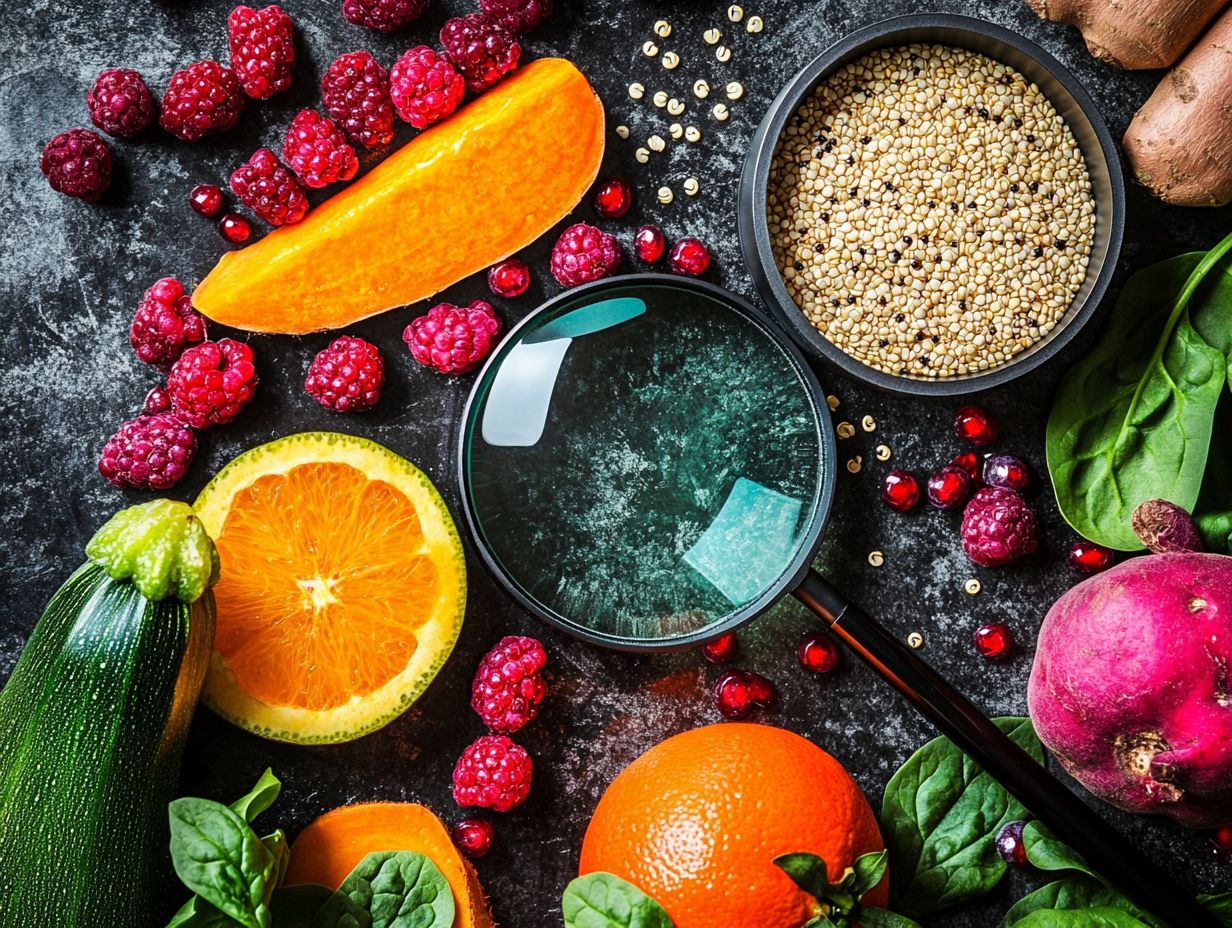
The effect of nutrient-dense foods on your health is significant. They play a crucial role in preventing nutrient deficiencies and promoting long-term wellness.
These foods are full of vitamins, minerals, and antioxidants that help prevent chronic diseases, such as heart disease and diabetes, and enhance mental clarity and emotional stability.
By incorporating a variety of colorful fruits, vegetables, whole grains, lean proteins, and healthy fats into your diet, you support essential bodily functions and boost your energy levels.
When you prioritize a nutrient-dense diet, you equip your body to fight inflammation, improve your mood, and maintain a healthy weight, paving the way for a more vibrant and fulfilling life.
Identifying Nutrient-Dense Foods
Identifying nutrient-dense foods requires a keen ability to read nutrition facts and food labels. By focusing on nutrient amounts and quality, you can make healthier food choices that benefit your well-being, guided by the science of nutrient density in dietary guidelines.
What nutrient-dense foods do you love? Share your favorites!
Key Nutrients to Look For
When choosing nutrient-rich foods, focus on key nutrients like important vitamins, protein sources, and minerals such as calcium, iron, and potassium. These elements are vital for your overall health and wellness.
For instance, vitamin A is crucial for vision and immune function. B vitamins, including B12 and folate, help with energy metabolism and the production of red blood cells.
Vitamin C, found in citrus fruits and leafy greens, boosts your immune system and aids in collagen production. Don’t forget about protein sources like legumes, nuts, and lean meats; they provide essential amino acids for muscle repair and growth.
Minerals play a significant role too. Magnesium supports bone health and can be found in seeds and whole grains. Iron, which is essential for oxygen transport, is present in meats, beans, and spinach. Potassium helps regulate blood pressure and is easily sourced from bananas, avocados, and sweet potatoes.
By adding these nutrient-rich foods to your daily meals, you can greatly improve the quality of your diet.
Sources of Nutrient-Dense Foods
The best sources of nutrient-dense foods include whole options like fruits, vegetables, legumes, low-fat dairy, and lean proteins, all packed with essential nutrients.
Incorporate a variety of these foods into your diet to enhance your overall health. For example, enjoy vibrant fruits like berries, oranges, and apples; they offer antioxidants and vitamins that strengthen your immune system.
- Leafy greens such as spinach, kale, and Swiss chard are high in fiber and full of minerals.
- Legumes, including lentils, chickpeas, and black beans, are great sources of protein and fiber, supporting heart health.
- Opt for low-fat dairy options like yogurt and cottage cheese, which provide essential calcium without unnecessary calories.
- Lean proteins such as fish, chicken, and tofu are key for muscle maintenance and repair, ensuring a well-rounded and nutritious diet.
Incorporating Nutrient-Dense Foods into Your Diet
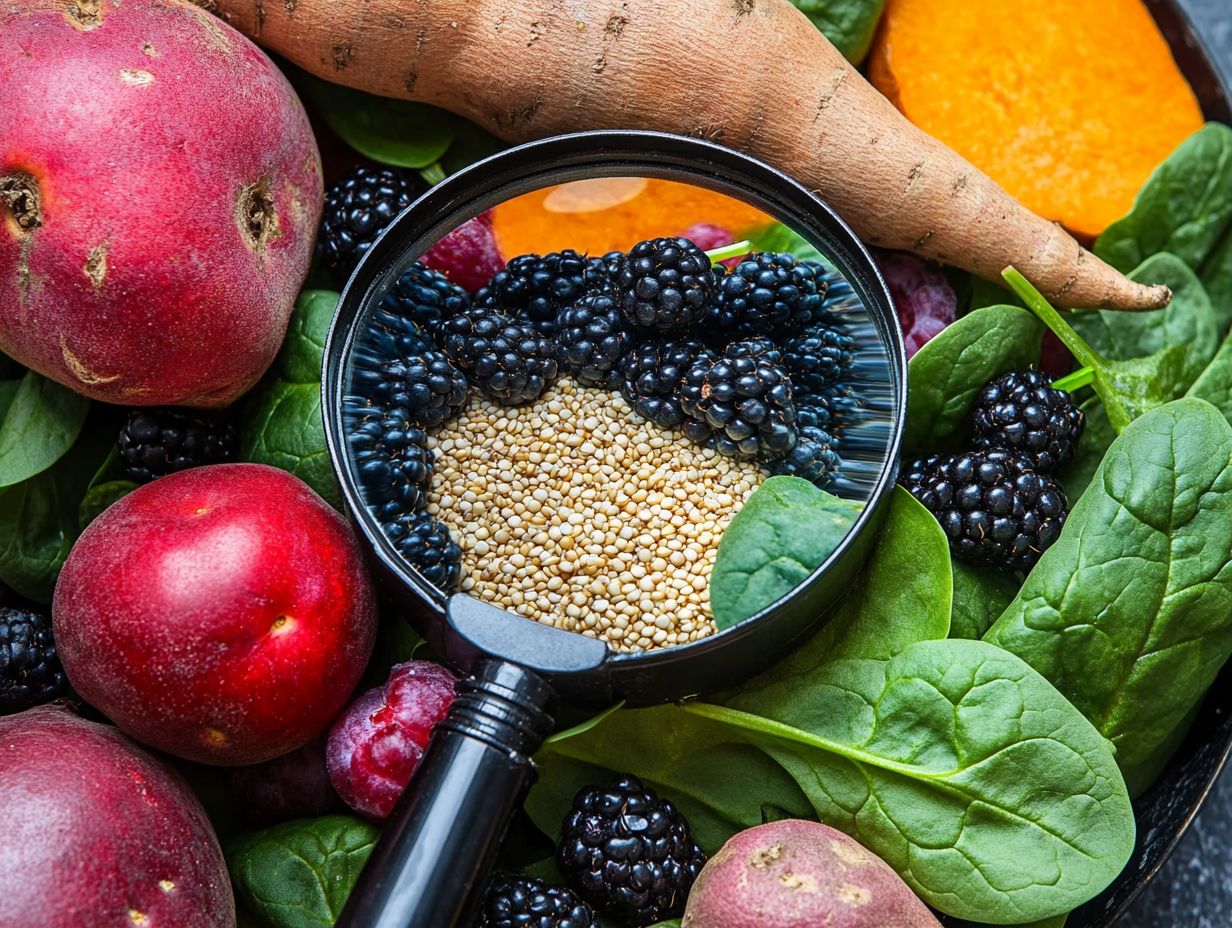
Adding nutrient-dense foods to your diet is important for healthy eating. You can easily achieve this through thoughtful meal planning and choosing the right cooking methods.
Tips and Recipes for a Nutrient-Dense Meal Plan
Creating a nutrient-dense meal plan involves more than just selecting ingredients; it s about using tips and recipes that elevate your healthy eating and ensure your meals are full of nutrients.
Focus on a mix of whole grains, lean proteins, and a colorful array of vegetables to enhance your dietary quality. Using quinoa or brown rice as a base adds essential fiber and minerals. Adding beans or lentils boosts your protein and iron intake.
Experiment with cooking methods like steaming, roasting, or grilling to preserve nutrients and add flavor to your meals.
Try making a vibrant stir-fry with seasonal veggies and a protein source for a complete and satisfying dish that captures the essence of nutrient density.
Frequently Asked Questions
Here are some common questions about nutrient-dense foods:
What are nutrient-dense foods?
Nutrient-dense foods provide a high amount of beneficial nutrients, such as vitamins, minerals, and antioxidants, while having relatively low calories.
Why is it important to identify nutrient-dense foods?
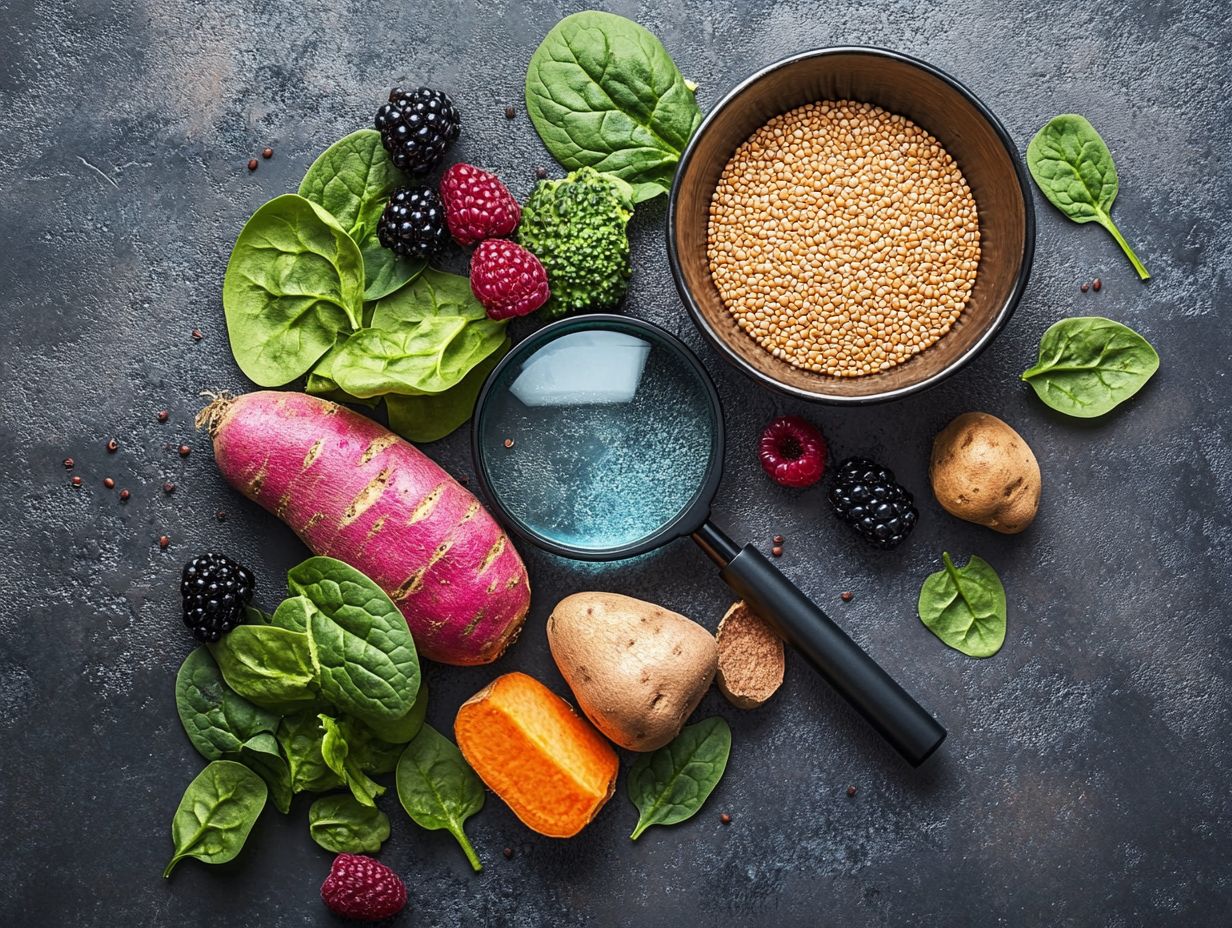
Identifying nutrient-dense foods is crucial because they help you meet your daily nutrient needs without consuming excess calories, which can lead to weight gain and various health issues.
How can I identify nutrient-dense foods?
You can identify nutrient-dense foods by looking at a score that shows how many nutrients are in a food compared to its calories. For tips on choosing the best options, check out this guide on how to identify nutrient-rich snack options. Foods with a higher score are considered more nutrient-dense.
What are Some Examples of Nutrient-Dense Foods?
Nutrient-dense foods are packed with vitamins and minerals for their calories. Examples include fruits, vegetables, whole grains, lean proteins, and healthy fats like avocados and nuts.
How Can I Add Nutrient-Dense Foods to My Diet?
Start by making small swaps in your meals. Replace processed snacks with fresh fruits or veggies and choose whole grains instead of refined ones.
Are All Nutrient-Dense Foods Healthy?
No, some nutrient-dense foods can still be unhealthy. Processed foods may have added nutrients but can also contain harmful ingredients like added sugars and saturated fats. Focus on whole, unprocessed foods for the best health benefits.

